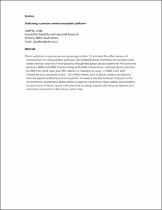JavaScript is disabled for your browser. Some features of this site may not work without it.
- ResearchSpace
- →
- Research Publications/Outputs
- →
- Journal Articles
- →
- View Item
| dc.contributor.author |
Lau, WWY

|
|
| dc.contributor.author |
Shiran, J

|
|
| dc.contributor.author |
Bailey, RM

|
|
| dc.contributor.author |
Cook, E

|
|
| dc.contributor.author |
Stuchtey, MR

|
|
| dc.contributor.author |
Koskella, J

|
|
| dc.contributor.author |
Velis, CA

|
|
| dc.contributor.author |
Boucher, J

|
|
| dc.contributor.author |
Murphy, MB

|
|
| dc.contributor.author |
Godfrey, Linda K

|
|
| dc.date.accessioned | 2020-09-14T18:31:52Z | |
| dc.date.available | 2020-09-14T18:31:52Z | |
| dc.date.issued | 2020-07 | |
| dc.identifier.citation | Lau, W.W.Y. et al. 2020. Evaluating scenarios toward zero plastic pollution. Science, 23 July 2020: eaba9475, DOI: 10.1126/science.aba9475pp12 | en_US |
| dc.identifier.issn | 1095-9203 | |
| dc.identifier.issn | 0036-8075 | |
| dc.identifier.uri | https://science.sciencemag.org/content/early/2020/07/22/science.aba9475 | |
| dc.identifier.uri | DOI: 10.1126/science.aba9475 | |
| dc.identifier.uri | http://hdl.handle.net/10204/11575 | |
| dc.description | Copyright: 2020 Amer Assoc Advancement Science. Due to copyright restrictions, the attached PDF file only contains the abstract of the full text item. For access to the full text item, please consult the publisher's website. The definitive version of the work is published in Science, 23 Jul 2020: eaba9475, DOI: 10.1126/science.aba9475pp12 | en_US |
| dc.description.abstract | Plastic pollution is a pervasive and growing problem. To estimate the effectiveness of interventions to reduce plastic pollution, we modeled stocks and flows of municipal solid waste and four sources of microplastics through the global plastic system for five scenarios between 2016 and 2040. Implementing all feasible interventions reduced plastic pollution by 40% from 2016 rates and 78% relative to ‘business as usual’ in 2040. Even with immediate and concerted action, 710 million metric tons of plastic waste cumulatively entered aquatic and terrestrial ecosystems. To avoid a massive build-up of plastic in the environment, coordinated global action is urgently needed to reduce plastic consumption, increase rates of reuse, waste collection and recycling, expand safe disposal systems and accelerate innovation in the plastic value chain. | en_US |
| dc.language.iso | en | en_US |
| dc.publisher | AMER ASSOC ADVANCEMENT SCIENCE | en_US |
| dc.relation.ispartofseries | Workflow;23650 | |
| dc.subject | Plastic pollution | en_US |
| dc.subject | Microplastics | en_US |
| dc.title | Evaluating scenarios toward zero plastic pollution | en_US |
| dc.type | Article | en_US |
| dc.identifier.apacitation | Lau, W., Shiran, J., Bailey, R., Cook, E., Stuchtey, M., Koskella, J., ... Godfrey, L. K. (2020). Evaluating scenarios toward zero plastic pollution. http://hdl.handle.net/10204/11575 | en_ZA |
| dc.identifier.chicagocitation | Lau, WWY, J Shiran, RM Bailey, E Cook, MR Stuchtey, J Koskella, CA Velis, J Boucher, MB Murphy, and Linda K Godfrey "Evaluating scenarios toward zero plastic pollution." (2020) http://hdl.handle.net/10204/11575 | en_ZA |
| dc.identifier.vancouvercitation | Lau W, Shiran J, Bailey R, Cook E, Stuchtey M, Koskella J, et al. Evaluating scenarios toward zero plastic pollution. 2020; http://hdl.handle.net/10204/11575. | en_ZA |
| dc.identifier.ris | TY - Article AU - Lau, WWY AU - Shiran, J AU - Bailey, RM AU - Cook, E AU - Stuchtey, MR AU - Koskella, J AU - Velis, CA AU - Boucher, J AU - Murphy, MB AU - Godfrey, Linda K AB - Plastic pollution is a pervasive and growing problem. To estimate the effectiveness of interventions to reduce plastic pollution, we modeled stocks and flows of municipal solid waste and four sources of microplastics through the global plastic system for five scenarios between 2016 and 2040. Implementing all feasible interventions reduced plastic pollution by 40% from 2016 rates and 78% relative to ‘business as usual’ in 2040. Even with immediate and concerted action, 710 million metric tons of plastic waste cumulatively entered aquatic and terrestrial ecosystems. To avoid a massive build-up of plastic in the environment, coordinated global action is urgently needed to reduce plastic consumption, increase rates of reuse, waste collection and recycling, expand safe disposal systems and accelerate innovation in the plastic value chain. DA - 2020-07 DB - ResearchSpace DP - CSIR KW - Plastic pollution KW - Microplastics LK - https://researchspace.csir.co.za PY - 2020 SM - 1095-9203 SM - 0036-8075 T1 - Evaluating scenarios toward zero plastic pollution TI - Evaluating scenarios toward zero plastic pollution UR - http://hdl.handle.net/10204/11575 ER - | en_ZA |






